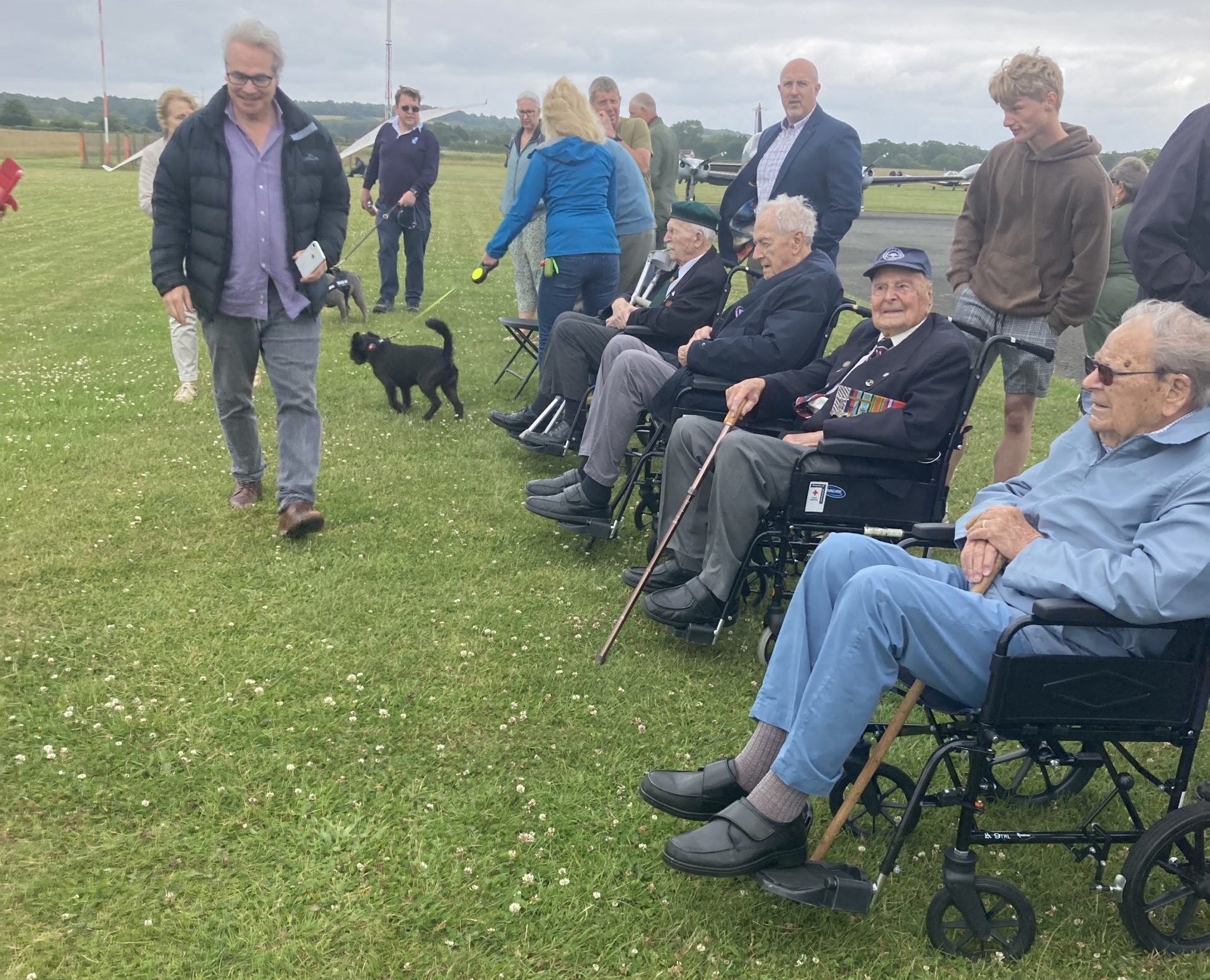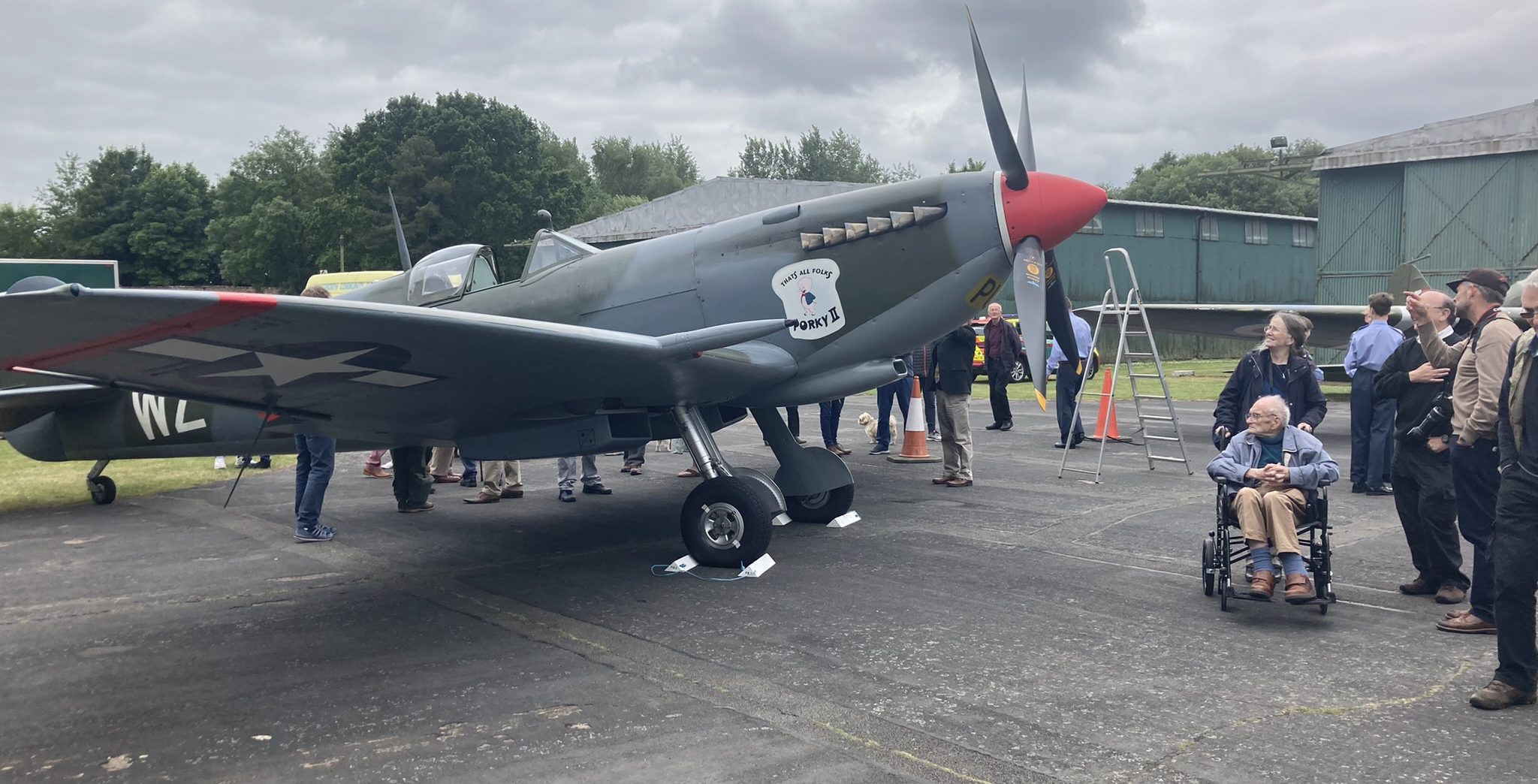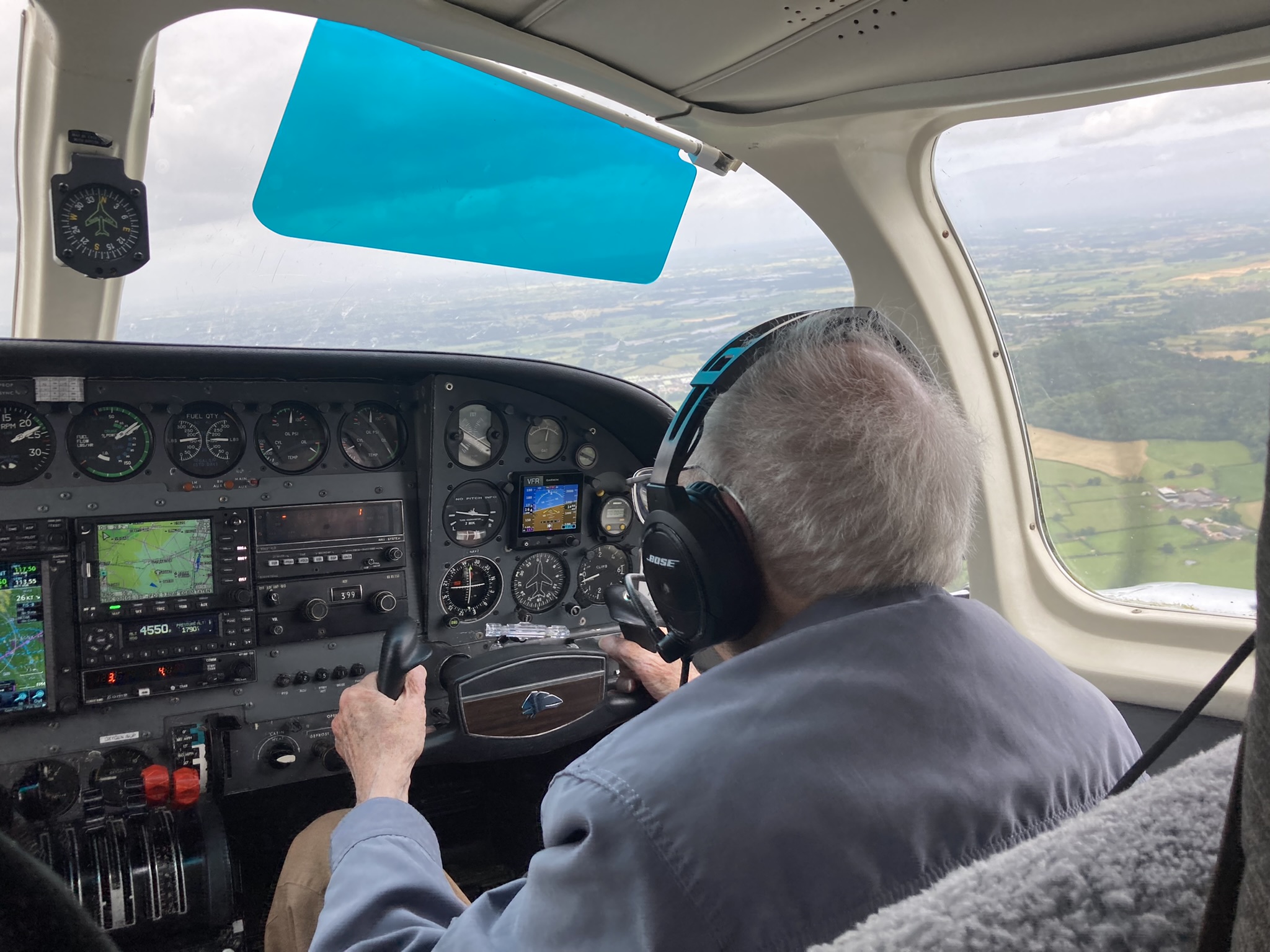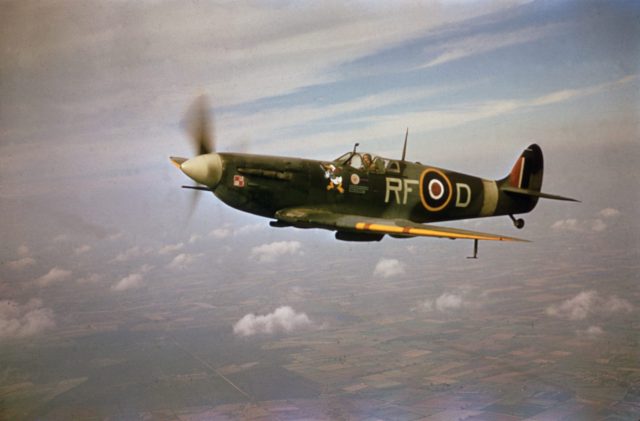“Oh the Spit was a lady in the air”, Bill says. “But a real bitch on the ground.” Credit: Fox Photos/Hulton Archive/Getty

The hangar is patriotically dressed with tiny flags and a large resin model of a Sunderland bomber. Miniature pilots in its cockpit have painted smiles. Sensible women are handing out buns and tea. Forties jazz plays; I might be in a J.B. Priestley novel, or at a village fete. The war may never have ended. And dotted around the room, unmistakable, unmistakably old are 43 RAF veterans.
This is Project Propeller, today. Every year, since 1999, it has spirited Royal Air Force vets up in the sky again. Younger pilots come for the war stories, and to say thank you. The vets meet their old comrades.
But we are close to the end. This year is the final meeting of Project Propeller. The number of Second World War pilots is dwindling. The last veterans of the last good war are now in their farcically late nineties. Their trademark taciturnity is becoming tombstone silence. The few keep getting fewer.
This was the last time these pilots would be in the same room together. They would be thanked and saluted and coddled to the very end. Their story, the myth — the good war — is where modern Britain was founded. Now, their hair is mercury and silver. Their hands are curled and cubed. Their skin is translucent, tattooed with melodramatic blotches. A whole century laden on their faces. Some are negligibly less ancient than others. All of them wear uniform blazers, and rustle with medals.
People are exquisitely careful with them. Utterly decorous and graceful. They are so valuable, and there are so few of them left. It is as if we are in a room with Henry’s longbowmen, or Nelson’s sailors. Our scope for reverence, usually so limited, is much larger here. There are many quiet grandsons, and great-grandsons, wheeling around their relatives.
Most of the veterans served with Bomber Command. There are pilots and engineers and navigators and gunners and bomb aimers. They had to be bloodhounds; they dropped a boiling furnace down on Germany for years, and 55,000 of them were killed doing it. All of them volunteered.
Bomber Command’s role in the war is ambiguous. Watching footage of German cities obliterated by the RAF in 1943, Winston Churchill asked: “Are we beasts? Are we taking this too far?” He preferred the underdog, classical heroism of 1940. But the campaign never relented. There was no memorial for Bomber Command until 2012.
I speak to Andy Andrews who was wireless operator in a Halifax, and John Bell, who was a bomb aimer in a Wellington. Andrews is 98, still standing, still driving. Bell is 100, in a wheelchair, but terrifyingly unsenile. He chews a ham sandwich, viciously, like it insulted his mother. Another vet toddles shakily over to Bell and asks him how he is getting on.
“About as well as you can be for a hundred not out”, says Bell. “Well, I am completely… buggered” says the other, with a spluttery laugh.
Bell and Andrews start telling me two quite insane stories about their bomber days.
Bell was 20 before he got in a plane. His legs were too long and prevented him from being a fighter pilot. The bombers were crewed by mostly teenage boys who all wanted to fly Spitfires.
“We lost an engine on the way to Hamburg”, he recalls. It was the end of July, 1943. They could not maintain their normal height of 20,000ft; the night air around them swam with flak. Turning back would look like cowardice, so they flew the raid at 10,000ft, underneath the other British bombers. German guns on the ground, and thick gusts of their friends’ bombs blowing above them.
I don’t understand how he wasn’t scared, but Bell simply says he was “indifferent about his feelings”. He would not worry about what he could not control. “Courage comes over a city at night.”
Beneath his plane, Hamburg was being incinerated during Operation Gomorrah. They set the air alight. 37,000 civilians died. It sounded, said one survivor, “like an old church organ where someone is playing all the notes”. Bell was a vengeful God then, raining fire and brimstone down from the heavens.
He is a more peaceful deity now, a bit more New Testament. “All I did was bomb the targets I was given… I’m quite happy with what I did.” He returns to his sandwich. Andrews bombed Dresden. He does not feel guilty, but he is not comfortable about it either. “I think it was a mistake. It never should have happened.”
Andrews was flying over Denmark in 1945 when his plane was hit by a Junkers Ju 88. Everything was on fire; three of the crew bailed out, two were quickly dead. He woke up after the plane had exploded. “I came to, pulled a rip cord, and my life was saved.” When he tells the story he looks like he might burst into laughter at any moment.
“I ended up in a POW camp in Denmark.” The war would be over in weeks and they all knew it. No need to do any Great Escape stuff. “We were liberated by General Patton. It’s the happiest I’ve ever been to see an American.”
Andrews misses his friends. “I’m the only one left now.” All his close peers were dead, his enemies were dead, much of his family was dead. The world he grew up in had more in common with the Victorian era than the Britain he lived to see. Barely a generation back from Darwin and Dickens. But he flew in the stratosphere.
These pilots and their machines figured in the stories we’ve been told all our lives. Velvety stories that roll between the spoken memories of relatives and old snapshots of uniformed men, between Where Eagles Dare and The Longest Day; stories that fold into the pewetery weight of a toy Spitfire in your hand. After the war Britain required myths. We were bankrupt, exhausted, confused. The myth we built around the RAF — that it was alone, that it muddled through, that it was uniquely courageous — was a form of compensation. It was the best we could do.
But these are men, not statues. Calling someone a hero is like comparing them to Casanova, or saying they’re a great dancer. From then on they are a greyhound chasing a mechanical hare. Always trying to catch up. If Bell and Andrews are heroes, then their whole existence after the war has been posthumous. Their unsurpassable status makes them less than human. All that mattered happened to them in the war.
Bell says that when the crew were trying to decide whether to turn their queasy bomber around 79 years ago, they thought: “Why not keep going to Hamburg.”
Why not? It was not about heroism — these men were fatalists. It was about fear and survival. To go on without stopping, never looking back, as the world below them cracked and collapsed. They were not destroying an enemy or defending their homes: they were fighting their own terrors. To overcome them was the only way to navigate a course towards life after the war.
When I ask them whether it was all worth it, Bell looks at me like I’ve asked him to describe the bottom of the ocean. An impossible question. “I don’t really want to go down that road.”
I cannot tell whether he means it was worth it, or it was not.

It’s one of those June days that cannot decide whether to be warm or cold, so we have both. There is blossom on the grass. All the vets have been brought in now, by light aircraft the same white colour as yachts. I am told that one of them hasn’t made it — he died yesterday afternoon.
A Spitfire sits outside a hangar. Men in deep middle age take selfies with it, as if they have met Kim Kardashian. It is a celebrity. The only Allied plane in service from the first day of the war until the last. So brilliant, so adaptable, so fast.
I speak to a selfie taker. There is a male glee in technical details. He knows the names of the parts. Words decorated with beads of numbers. Rolls-Royce Merlin 61 liquid-cooled 12-cylinder Vee piston engine, he says. Bellcrank hinge control. He smiles. Browning 0.303in (7.7mm) machine guns. He is talking in small prayers.
A plane is an orchestra of parts, playing together, he says. The machine is the point for him. He tells me this Spitfire was bought privately for £3 million. He has spent many afternoons mulling the Spit. You can hold its parts, weigh them, pet them. Machines are more manageable than emotions. When I look at the fuselage of that plane, the metal rounded to a propellered nose, I see slightness and fragility. I look at the sky, fill it with Germans, and imagine the terror.
A tiny man is trundled towards the Spitfire. This is Bill Williams, he is one of the last people alive who flew them during the war. He is 101 years old, and he is my lift home. He contemplates the Spit. It is like seeing a snail come face-to-face with a past shell.

His war was not glamorous. Bill is not part of the myth. He missed the Battle of Britain by three years. After training he flew out to Cairo, then to Calcutta.
There he made reconnaissance missions over the Irrawaddy Delta, photographing Japanese railways lines and fuel depots. His real enemy was the weather in monsoon season, which made flying deadly, not the Japanese, whose planes were not fast enough to get near his Spitfire.
Bill remembers it so well that he can take a pencil and draw a map of Burma for me on a flyer. He sketches out hills, rivers, and weather patterns. (I checked it against Google’s satellites later. It is absurdly accurate.)
The only weapon Bill’s plane had was a revolver. “I realised it was for me, if the plane came down and it was a choice between that and being captured by the Japanese”.
In their memoirs, Spitfire pilots often compare the machine to a woman. They were slenderly experienced teenagers. She was a perfect lady. She had no vices. She was beautiful. Most of them only knew sisters, mothers, aunts. They were describing falling in love for the first time.
“Oh the Spit was a lady in the air”, Bill says. “But a real bitch on the ground.” The undercarriage was narrow and weak. Landing it was never easy. “But it was very, very easy to fly. So light. You could literally fly it with this. With one finger.”
We have to get Bill back in the sky. He is cradled, with care and difficulty, into the cockpit of a Cessna 414. Graham, the pilot, does his checks. The plane begins to shudder and wobble.
Soon we are airborne, buffering and swaying, rapidly climbing over the East Midlands. Graham explains the controls to Bill. He is supposed to be flying three tonnes of metal in a minute. He has not flown anything bigger than a kite since the war. I am… somewhat concerned that Bill might accidentally kill all of us.
It is all in my head. Bill knows everything. He is taking us on a right turn, towards Nottingham, then levels the plane out. He checks the air speed. Altitude is perfectly maintained.
“It feels heavier than a Spitfire”, he mutters to himself in the headset. Suddenly he is attentive, composed, professional. Bill flew 1000 hours in the war. Suddenly a man who cannot walk has his wings back. I watch him closely, everyone in the plane does. Bill looks younger, visibly freshened. He is 20 again, avoiding purple-black monsoon clouds above a Burmese delta. He is not flying. He is travelling back in time.

The land below opens up. The yellow fields give way to rashes of red brick suburbs, ringed with motorways, and further out the south of England, and cities, and millions of people.
At this height everything is simplified and clarified. The problem with the myth around these men is that it makes them peaks. All the rest of us can do is dwell in their foothills. A beautiful, hobbling myth: Churchill as King Arthur, the RAF boys like Bill as his gleaming knights, Spitfire as Excalibur. “Nothing surpasses 1940” Churchill said. But how are you supposed to live if your greatest days are behind you?
All at once the stories seemed ridiculous and naive. Bill, Andy, John, and all the others were not myths or legends or heroes. They were survivors. They were skilled, they were dogged, and they were very lucky.
Up here there is only light, wind, and speed. Nothing else matters. England is streaming below us. I look at the list of questions, of the ‘what was it like back then’ variety, for Bill on my phone. They seem stupid now. There is only one thing it makes sense to ask him: how does it feel to be back?
“Oh.” He pauses, searching for the right word. “It is wonderful.”









Join the discussion
Join like minded readers that support our journalism by becoming a paid subscriber
To join the discussion in the comments, become a paid subscriber.
Join like minded readers that support our journalism, read unlimited articles and enjoy other subscriber-only benefits.
Subscribe